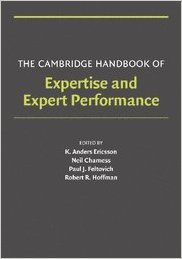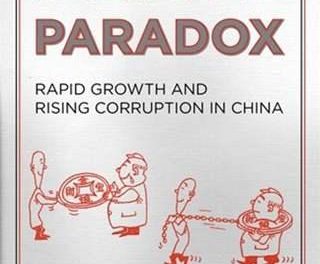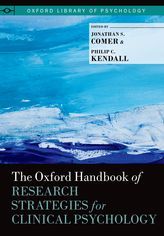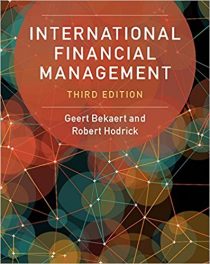 Editors: K. Anders Ericsson, Neil Charness, Paul J. Feltovich, and Robert R. Hoffman
Editors: K. Anders Ericsson, Neil Charness, Paul J. Feltovich, and Robert R. Hoffman
Publisher: Cambridge University Press – 901 pages
Book Review by: Sonu Chandiram
We sometimes refer to ‘experts’ to get their take on a whole lot of questions pertaining to many aspects of our lives – our health, finances, professional performance, and social interactions, for example. But how do we know they are experts in their respective field?
Our common sense tells us that when it comes to an expert claiming to help us accomplish something we want, the best way to decide whether they can really help us is to know if they have done it for themselves, if not at least for someone else.
- Harv Eker once said that someone once boasted to him “I can make you a millionaire!” Eker then asked him simply “Are you a millionaire? That expert had to admit he was not.
This thick book of over 900 pages on expertise and expert performance is the first one that takes a broad and deep look on expertise itself, the very ‘stuff’ that experts possess for them to be called experts. Must an expert simply possess knowledge, or ability, as well, to be useful to someone to help some part of his life?
So what is expertise? What are its components? How is expertise related to similar characteristics in people such as insight, and talent? What are the different measurement methods in testing an expert’s knowledge (derived from books as well as real-life experience)
This book, consisting of articles written by ‘experts on expertise’ answers those questions, and much, much more. The review the world’s accumulated scientific knowledge on expertise and expert performance. Its coverage of subjects relating to expertise is indeed very broad, as shown from the list of its chapters presented below to provide you an overview of its content:
- Part I. Introduction and Perspective
- An Introduction to the Cambridge Handbook of Expertise and Expert Performance: Its Development, Organization, and Content
- Two Approaches to the Study of Experts’ Characteristics
- Expertise, Talent, and Encouragement
- Part II. Overview of Approaches to the Study of Expertise – Brief Historical Accounts of Theories and Methods
- Studies of Expertise from Psychological Perspectives
- Educators and Expertise: A Brief History of Theories and Models
- Expert Systems: A Perspective from Computer Science
- Professionalization, Scientific Expertise and Elitism: A Sociological Perspective
- Part III. Methods for Studying the Structure of Expertise
- Observation of Work Practices in Natural Settings
- Methods for Studying the Structure of Expertise: Psychometric Approaches
- Laboratory Methods for Assessing Experts’ and Novices’ Knowledge
- Task Analysis
- Eliciting and Representing the Knowledge of Experts
- Protocol Analysis and Expert Thought: Concurrent Verbalizations of Thinking During Experts’ Performance of Representative Tasks
- Simulation for Performance and Training
- Part IV. Methods for Studying the Acquisition and Maintenance of Expertise
- Laboratory Studies of Training, Skill Acquisition, and Retention of Performance
- Retrospective Interviews in the Study of Expertise and Expert Performance
- Time Budgets, Diaries, and Analyses of Concurrent Practice Activities
- Historiometric Methods
V.A Domains of Expertise
- Expertise in Medicine and Surgery
- Expertise and Transportation
- Expertise in Software Design
- Professional Writing Expertise
- Professional Judgments and ‘Naturalistic Decision Making’
- Decision-Making Expertise
- The Making of a Dream Team: When Expert Teams Do Best
V.B Arts, Sports, and Motor Skills
- Music
- Expert Performance in Sport: A Cognitive Perspective
- Expert Performance in Acting, Ballet, and Contemporary Dance
- Perceptual-Motor Expertise
V.C Games and Other Types of Expertise
- Expertise in Chess
- Exceptional Memory
- Mathematical Expertise
- Expertise in History
- Part VI. Generalizable Mechanisms Mediating Expertise and General Issues
- A Merging Theory of Expertise and Intelligence
- Tacit Knowledge, Practical Intelligence, and Expertise
- Expertise and Situation Awareness
- Brain Changes to the development of Expertise: Neuroanataomical and Neurophysiological Evidence About Skill-Based Adaptations
- The Influence of Experience and Deliberate Practice on the Development of Superior Expert Performance
- Development and Adaptation of Expertise: The Role of Self-Regulatory Processes and Beliefs
- Aging and Expertise
- Social and Sociological Factors in the Development of Expertise
- Modes of Expertise in Creative Thinking: Evidence from Case Studies
Through 42 chapters, some 80 specialists on the qualities that experts possess, discuss what sets them apart from non-experts in terms of their backgrounds, development, innate talent, knowledge, reasoning, social support, and training. The author-specialists studied experts in 15 major domains through a variety of different means, including interviews, and observations of their activities during the course of their daily lives.
Common characteristics of experts that cut across the 15 domains are reviewed in this book on various aspects of expertise, including the following:
- Aging
- Brain-activity differences
- Creativity
- Deliberate practice
- Knowledge management
- Practical intelligence
- Self-regulated learning
This is probably the best book out there on the subject of expertise and expert performance. What makes it valuable is not only the fact that the editors and authors are some of the most qualified specialists, but also that it is based on solid empirical evidence derived from extensive research.
Editors:
Anders Ericsson is Conradi Eminent Scholar and Professor of Psychology at Florida State University. He has published many books, including Toward a General Theory of Expertise: Prospects and Limits. and The Road to Excellence: The Acquisition of Expert Performance in the Arts and Sciences, Sports and Games.
Neil Charness is Professor of Psychology and Research Associate at the Pepper Institute on Aging and Public Policy, at Florida State University. He is on the editorial boards of Psychology and Aging, the Journal of Gerontology; Psychological Sciences, and Gerontechnology.
Paul J. Feltovich is a Research Scientist at the Florida Institute for Human and Machine Cognition in Pensacola, Florida. He has authored nearly 100 professional articles and two previous books.
Robert R. Hoffman is a Research Scientist at the Florida Institute for Human and Machine Cognition in Pensacola, Florida. He is coeditor of the regular department “Human Centered Computing in the journal IEEE: Intelligent Systems.






